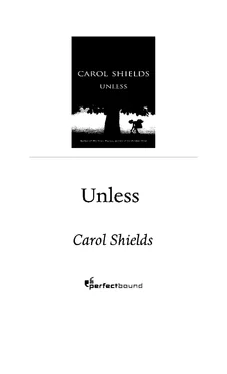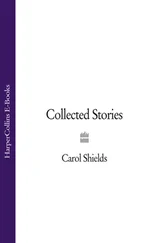Carol Shields - Unless
Здесь есть возможность читать онлайн «Carol Shields - Unless» — ознакомительный отрывок электронной книги совершенно бесплатно, а после прочтения отрывка купить полную версию. В некоторых случаях можно слушать аудио, скачать через торрент в формате fb2 и присутствует краткое содержание. Жанр: Современная проза, на английском языке. Описание произведения, (предисловие) а так же отзывы посетителей доступны на портале библиотеки ЛибКат.
- Название:Unless
- Автор:
- Жанр:
- Год:неизвестен
- ISBN:нет данных
- Рейтинг книги:4 / 5. Голосов: 1
-
Избранное:Добавить в избранное
- Отзывы:
-
Ваша оценка:
- 80
- 1
- 2
- 3
- 4
- 5
Unless: краткое содержание, описание и аннотация
Предлагаем к чтению аннотацию, описание, краткое содержание или предисловие (зависит от того, что написал сам автор книги «Unless»). Если вы не нашли необходимую информацию о книге — напишите в комментариях, мы постараемся отыскать её.
Unless — читать онлайн ознакомительный отрывок
Ниже представлен текст книги, разбитый по страницам. Система сохранения места последней прочитанной страницы, позволяет с удобством читать онлайн бесплатно книгу «Unless», без необходимости каждый раз заново искать на чём Вы остановились. Поставьте закладку, и сможете в любой момент перейти на страницу, на которой закончили чтение.
Интервал:
Закладка:
I don’t know what that word really means, though words are my business. The Old English word wearth, I discovered the other day on the Internet, means outcast; the other English word, its twin, its cancellation, is worth — we know what that means and know to distrust it.
It is the word wearth that Norah has swallowed. This is the place she’s claimed, a whole world constructed on stillness. An easy stance, says the condemning, grieving mother, easy to find and maintain, given enough practice. A sharper focus could be achieved by tossing in an astringent fluid, a peppery sauce, irony, rebellion, tattoos and pierced tongue and spiked purple hair, but no. Norah embodies invisibility and goodness, or at least she is on the path — so she said in our last conversation, which was eight weeks ago, the eleventh of April. She wore torn jeans that day and a rough plaid shawl that was almost certainly a car blanket. Her long pale hair was matted. She refused to look us in the eye, but she did blink in acknowledgement — I’m sure of it — when I handed her a sack of cheese sandwiches and Tom dropped a roll of twenty-dollar bills in her lap. Then she spoke, in her own voice, but emptied of connection. She could not come home. She was on the path to goodness. At that moment I, her mother, was more absent from myself than she; I felt that. She was steadfast.
She could not be diverted. She could not “be” with us.
How did this part of the narrative happen? We know it didn’t rise out of the ordinary plot lines of a life story. An intelligent and beautiful girl from a loving family grows up in Orangetown, Ontario, her mother’s a writer, her father’s a doctor, and then she goes off the track. There’s nothing natural about her efflorescence of goodness. It’s abrupt and brutal. It’s killing us. What will really kill us, though, is the day we don’t find her sitting on her chosen square of pavement.
But I didn’t know any of this when I sat in that Burgundy garden dreaming about writing a novel. I thought I understood something of a novel’s architecture, the lovely slope of predicament, the tendrils of surface detail, the calculated curving upward into inevitability, yet allowing spells of incorrigibility, and then the ending, a corruption of cause and effect and the gathering together of all the characters into a framed operatic circle of consolation and ecstasy, backlit with fibre-optic gold, just for a moment on the second-to-last page, just for an atomic particle of time.
I had an idea for my novel, a seed, and nothing more. Two appealing characters had suggested themselves, a woman and a man, Alicia and Roman, who live in Wychwood, which is a city the size of Toronto, who clamour and romp and cling to the island that is their life’s predicament — they long for love, but selfishly strive for self-preservation. Roman is proud to be choleric in temperament. Alicia thinks of herself as being reflective, but her job as assistant editor on a fashion magazine keeps her too occupied to reflect.
9. And I had a title, My Thyme Is Up. It was a pun, of course, from an old family joke, and I meant to write a jokey novel. A light novel. A novel for summertime, a book to read while seated in an Ikea wicker chair with the sun falling on the pages as faintly and evenly as human breath. Naturally the novel would have a happy ending. I never doubted but that I could write this novel, and I did, in 1997 — in a swoop, alone, during three dark winter months when the girls were away all day at school.
10. The Middle Years, the translation of volume three of Wester-man’s memoirs, is coming out this fall. Volume three explores Westerman’s numerous love affairs with both men and women, and none of this will be shocking or even surprising to her readers. What is new is the suppleness and strength of her sentences. Always an artist of concision and selflessness, she has arrived in her old age at a gorgeous fluidity and expansion of phrase. My translation doesn’t begin to express what she has accomplished. The book is stark; it’s also sentimental; one balances and rescues the other, strangely enough. I can only imagine that those endless calcium pills Danielle chokes down every morning and the vitamin E and the emu oil capsules have fed directly into her vein of language so that what lands on the page is larger, more rapturous, more self-forgetful than anything she’s written before, and all of it sprouting short, swift digressions that pretend to be just careless asides, little swoons of surrender to her own experience, inviting us, her readers, to believe in the totality of her abandonment.
Either that or she’s gone senile to good effect, a grand loosening of language in her old age. The thought has more than once occurred to me.
Another thought has drifted by, silken as a breeze against a lattice. There’s something missing in these memoirs, or so I think in my solipsistic view. Danielle Westerman suffers, she feels the pangs of existential loneliness, the absence of sexual love, the treason of her own woman’s body. She has no partner, no one for whom she is the first person in the world order, no one to depend on as I do on Tom. She does not have a child, or any surviving blood connection for that matter, and perhaps it’s this that makes the memoirs themselves childlike.
They go down like good milk, foaming, swirling in the glass.
11. I shouldn’t mention Book Number Eleven since it is not a fait accompli, but I will. I’m going to write a second novel, a sequel to My Thyme Is Up. Today is the day I intend to begin.
The first sentence is already tapped into my computer: “Alicia was not as happy as she deserved to be.”
I have no idea what will happen in this book. It is a mere abstraction at the moment, something that’s popped out of the ground like the rounded snout of a crocus on a cold lawn.
I’ve stumbled up against this idea in my clumsy manner, and now the urge to write it won’t go away. This will be a book about lost children, about goodness, and going home and being happy and trying to keep the poison of the printed page in perspective. I’m desperate to know how the story will turn out.
Nearly
We are more than halfway through the year 2000. Toward the beginning of August, Tom’s old friend Colin Glass came to dinner one night, driving out from Toronto. Over coffee he attempted to explain the theory of relativity to me.
I was the one who invited him to launch into the subject. Relativity is a piece of knowledge I’ve always longed to understand, a big piece, but the explainers tend to go too fast or else they skip over a step they assume their audience has already absorbed. Apparently, there was once a time when only one person in the world understood relativity (Einstein), then two people, then three or four, and now most of the high-school kids who take physics have at least an inkling, or so I’m told. How hard can it be? And it’s passed, according to Colin, from crazy speculation to confirmed fact, which makes it even more important to understand. I’ve tried, but my grasp feels tenuous. So, the speed of light is constant. Is that all?
Ordinarily, I love these long August evenings, the splash of amber light that falls on the white dining-room walls just before the separate shades of twilight take over. The medallion leaves that flutter their round ghost shadows. All day I’d listened to the white-throated sparrows in the woods behind our house; their song resembles the Canadian national anthem, at least the opening bars. Summer was dying, but in pieces. We’d be eating outside if it weren’t for the wasps. Good food, the company of a good friend, what more could anyone desire? But I kept thinking of Norah sitting on her square of pavement and holding up the piece of cardboard with the word GOODNESS, and then I lost track of what Colin was saying.
Читать дальшеИнтервал:
Закладка:
Похожие книги на «Unless»
Представляем Вашему вниманию похожие книги на «Unless» списком для выбора. Мы отобрали схожую по названию и смыслу литературу в надежде предоставить читателям больше вариантов отыскать новые, интересные, ещё непрочитанные произведения.
Обсуждение, отзывы о книге «Unless» и просто собственные мнения читателей. Оставьте ваши комментарии, напишите, что Вы думаете о произведении, его смысле или главных героях. Укажите что конкретно понравилось, а что нет, и почему Вы так считаете.












